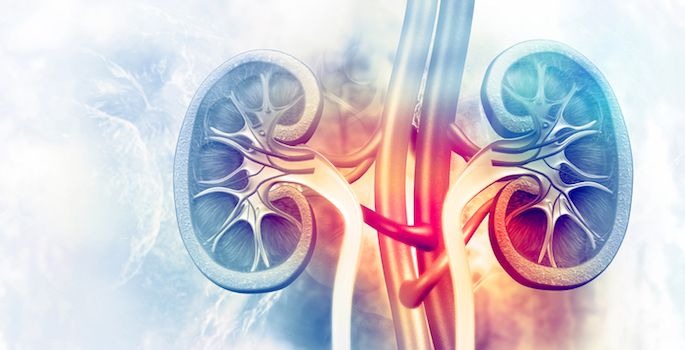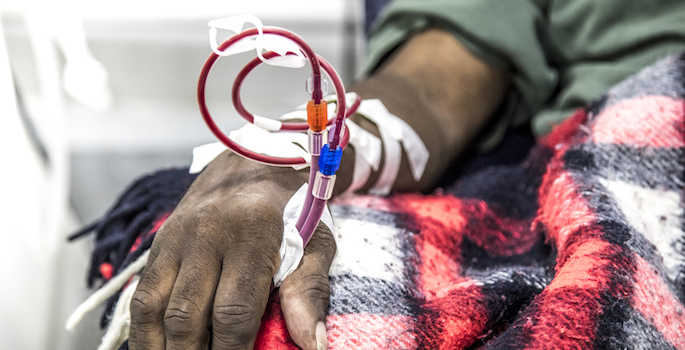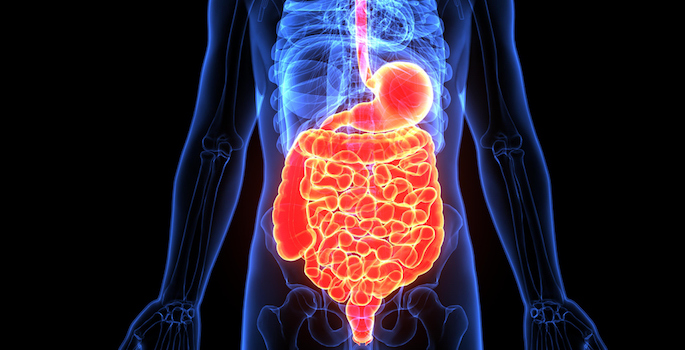NIH
-

Robotic technology speeds arrhythmia gene classification
Vanderbilt University Medical Center investigators have used high-throughput robotic technology to rapidly study and classify variations in a gene linked to heart rhythm disorders and cardiac conditions. Read MoreJun 12, 2020
-

Staph’s activation of blood clotting
Staph bacteria may change the factor they use to activate blood clotting — to evade the immune response — a new study suggests. Read MoreJun 9, 2020
-

Protecting the injured kidney
Leslie Gewin and colleagues have upended conventional dogma about Wnt/beta-catenin signaling in the kidney, finding that it protects against chronic kidney disease rather than promoting it. Read MoreJun 4, 2020
-

Potential new cancer target
Vanderbilt researchers have discovered the involvement of a certain type of adenosine receptor in mediating signaling that supports tumor growth and metastasis. Read MoreJun 4, 2020
-

Probing innate immunity
Manuel Ascano team validates an inhibitor of the cGAS-STING signaling pathway, which is important for cellular innate immunity against bacteria, viruses, and our own damaged DNA. Read MoreMay 19, 2020
-

Implant one day may replace dialysis
Vanderbilt researchers used pharmacological manipulations to increase salt and water transport by kidney cells grown in culture, a step necessary for realizing an implantable artificial kidney device. Read MoreMay 18, 2020
-

Study finds newborn opioid withdrawal rates show evidence of stabilizing
Rates of neonatal abstinence syndrome have plateaued after 20 years of increasing frequency across the country, according to a new study published in Health Affairs. Read MoreMay 14, 2020
-

Antibodies eye Pacific Island “fever”
Vanderbilt Vaccine Center team isolates monoclonal antibodies against the mosquito-borne Ross River virus, which causes rash, fever and debilitating muscle and joint pain lasting three to six months. Read MoreMay 14, 2020
-

The adaptable anthrax bacterium
Vanderbilt researchers discover how anthrax bacterium defends itself against structural damage and resists the toxicity of the antimicrobial drug targocil. Read MoreMay 14, 2020
-

A dual-purpose metabolic switch
John York and colleagues have demonstrated that the protein Vip1 is a rare type of bifunctional enzyme: it can both synthesize and destroy key cellular signaling molecules. Read MoreMay 5, 2020
-

The role of diet in esophageal cancer
New findings suggest that dietary calcium and magnesium affect the risk of esophageal cancer; if confirmed in interventional studies, they could inform dietary modifications to reduce the burden of this cancer. Read MoreMay 4, 2020
-

EHRs, biobanks and Mendelian diseases
Electronic health records and biobanks can be effectively combined to detect and study Mendelian diseases such as cystic fibrosis. Read MoreApr 30, 2020
-

Antibody finding raises hopes for Marburg, COVID-19 treatments
Monoclonal antibodies against Marburg virus — a more lethal cousin of the RNA virus that causes COVID-19 — may aid in the development of antibody "cocktails" to counter viral infection. Read MoreApr 30, 2020
-

Transporter’s role in gut barrier
A disease-associated mutation in a transporter protein impairs gut barrier function, leading to gastrointestinal disease and chronic infections. Read MoreApr 21, 2020
-

Reducing stress in parents of children with autism
Parents of children with autism spectrum disorders benefited from the addition of mindfulness-based stress reduction to parent-implemented behavioral interventions. Read MoreApr 21, 2020
-

‘Tuning’ cell shape for division
Dylan Burnette and colleagues have discovered that two forms of the molecular motor protein myosin have distinct roles in regulating cell shape during cell division. Read MoreApr 20, 2020
-

Damage, disruption, delirium
New findings suggest that treatments that decrease oxidative damage might help with postoperative delirium that occurs in up to 30% of cardiac surgery patients. Read MoreApr 20, 2020
-

Study launched to test hydroxychloroquine as treatment for COVID-19
Vanderbilt University Medical Center is leading a clinical trial to understand if a well-known drug used for malaria and rheumatologic conditions is safe and effective in treating hospitalized adults with COVID-19. Read MoreApr 10, 2020
-

Race, hormones and diabetes risk
Variation in the levels of hormones called natriuretic peptides may contribute to racial differences in susceptibility to diabetes, suggesting that this hormone system may be a target for reducing risk of the disease. Read MoreApr 8, 2020
-

Blocking stress-induced relapse
Danny Winder and colleagues are teasing apart the actions of neurotransmitter receptors in a brain region linked to anxiety and addiction, with a goal of finding treatments for substance use disorders. Read MoreApr 8, 2020